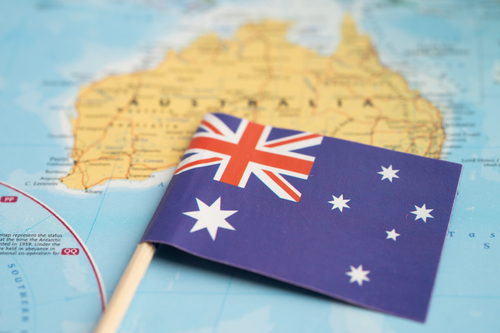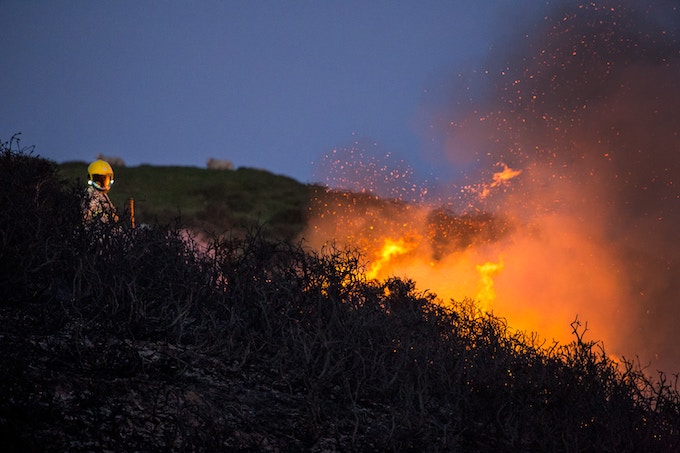
The Australian 2019/20 bushfire season has been one of the worst natural disasters our country has faced. Our thoughts are with those who have suffered from these fires and we praise the efforts of all firefighters, especially the volunteer brigades who have worked so hard to protect life and property at their own mortal risk and continue to do so.
This month Work Visa Lawyers has chosen to support the South Australian Country Fire Service Foundation with a financial contribution.
We have all seen the heart wrenching media images of immediate loss of people, wildlife and property but the social impacts will be far-reaching and persist long after the fires have been extinguished. In particular we would like to acknowledge the loss suffered locally in our native South Australia, particularly the Kangaroo Island Community. We have assisted the Southern Ocean Lodge for many years and we wish everyone involved in the lodge the best possible outcomes in the difficult time.
It is impossible to foresee all the areas of change as there are a number of factors at play. However we would like to shine a light on our nation’s immigration programmes, and consider the question “What effect will these catastrophic events have on immigration?”
While the media coverage often focuses on Humanitarian visas, they only make up a very small part of Australia’s visa programs. The below table sourced from Australian Government Department of Home Affairs, 2018 – 19 Migration Program Report Program year to 30 June 2019 displays the variety of visas the amount awarded last financial calendar year.
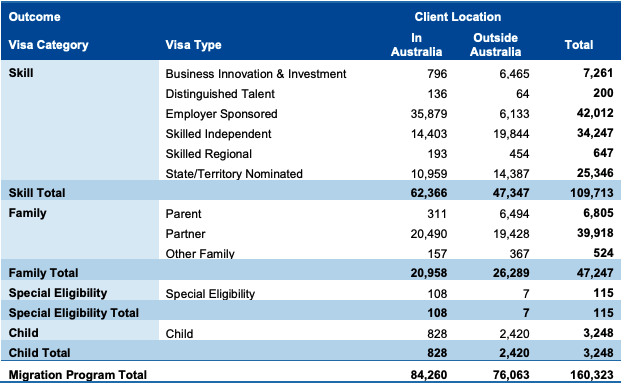
Source: Australian Government Department of Home Affairs, 2018 – 19 Migration Program Report Program year to 30 June 2019, page 13.
1. Disruption and Destruction
From the situation as it stands, we believe there are immediate and medium term issues for the holders of the following visas:
482 Temporary Skills Storage Visa
Holders of a 482 visa have a duty to work exclusively for the employer sponsoring the visa - but there’s a risk there if the sponsoring business is affected by the bushfires and there is no long work available.
This is a particular problem since there is an obligation on the visa holder to not cease work for more than 60 days or face visa cancellation.
A similar question arises for those with a visa still in processing.
187 Regional Sponsored Migration Scheme subclass 187 Visa
If the visa is still in processing but the business is now challenged by the results of bushfires, what fate will they face?
Working Holiday Visas, 417 and 462
Traditionally the jobs available for those looking to extend their temporary working visas have been fruit picking and other farming and agricultural work. This is seasonal and changes from place to place, so getting the necessary three months (or 88 days) normally involves moving from region to region as different work becomes available in different areas.This has historically been a reliable process for young travellers, but unfortunately it’s not that straightforward right now with agricultural regions among those worst affected by the fires and the contributing drought.
Individuals in fire affected properties may have found themselves having to deal with evacuation in the middle of their work placement. People so affected will need to find a way out of their region and find an alternative work arrangement in order to avoid being in breach of their visa conditions - a situation which adds a layer of stress on top of what might already be a traumatic experience.
Finding work might be harder for young travellers, however, with the devastating losses in many agricultural regions many of those fruit picking jobs might not be so easily available in 2020. Tourism related jobs in fire affected communities will be similarly affected as holiday makers cancel their bookings.
2. Rebuilding & Potential Skills Shortages for Special Skilled Visa & Working Holiday Visas

While there are clear negative impacts on work and life in regional areas right now, there will be opportunities too as communities look to rebuild. If you are looking to extend your working holiday visa for a second year or settle in Australia, and if you happen to have certain skills in the construction industry, then Australia could really use your help, and help you fulfil your visa obligations in the bargain.
With over 1200 homes lost to the fires so far, getting some of those towns back on their feet is a daunting challenge. Every state has been affected with many regional centres facing the prospect of rebuilding much of their towns and electricians, carpenters, plumbers and people with other related construction and trade skills will be in high demand.
There could be an actual increase in the amount of temporary work available for the right applicants. There are already well known skills shortages in relation to building trades in Australia, and the rebuilding effort is going to need a range of construction tradespeople and professionals to be deployed all around the country.
As we can see from the Department of Immigration SkillSelect program report on Occupation Ceiling numbers versus invitations grant the numbers are quite disparate.
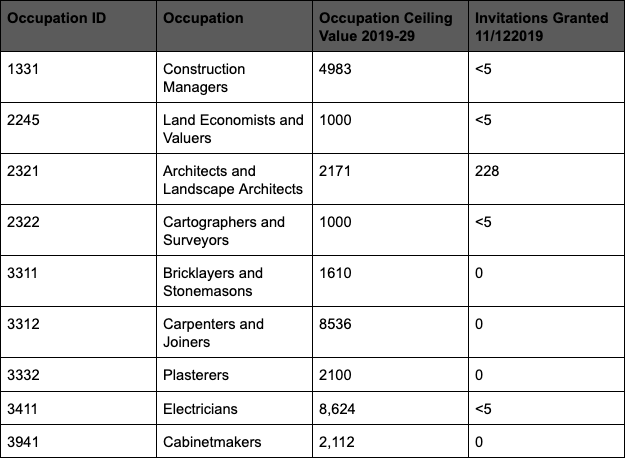
Australia is going to have to work hard to attract people in these skilled occupations and provide a higher rate of invitations in order to satisfy the labour market’s demand.
3. Reputational Damage for Australia-
Long term Effects on Australia in terms of key industries including Tourism and Education
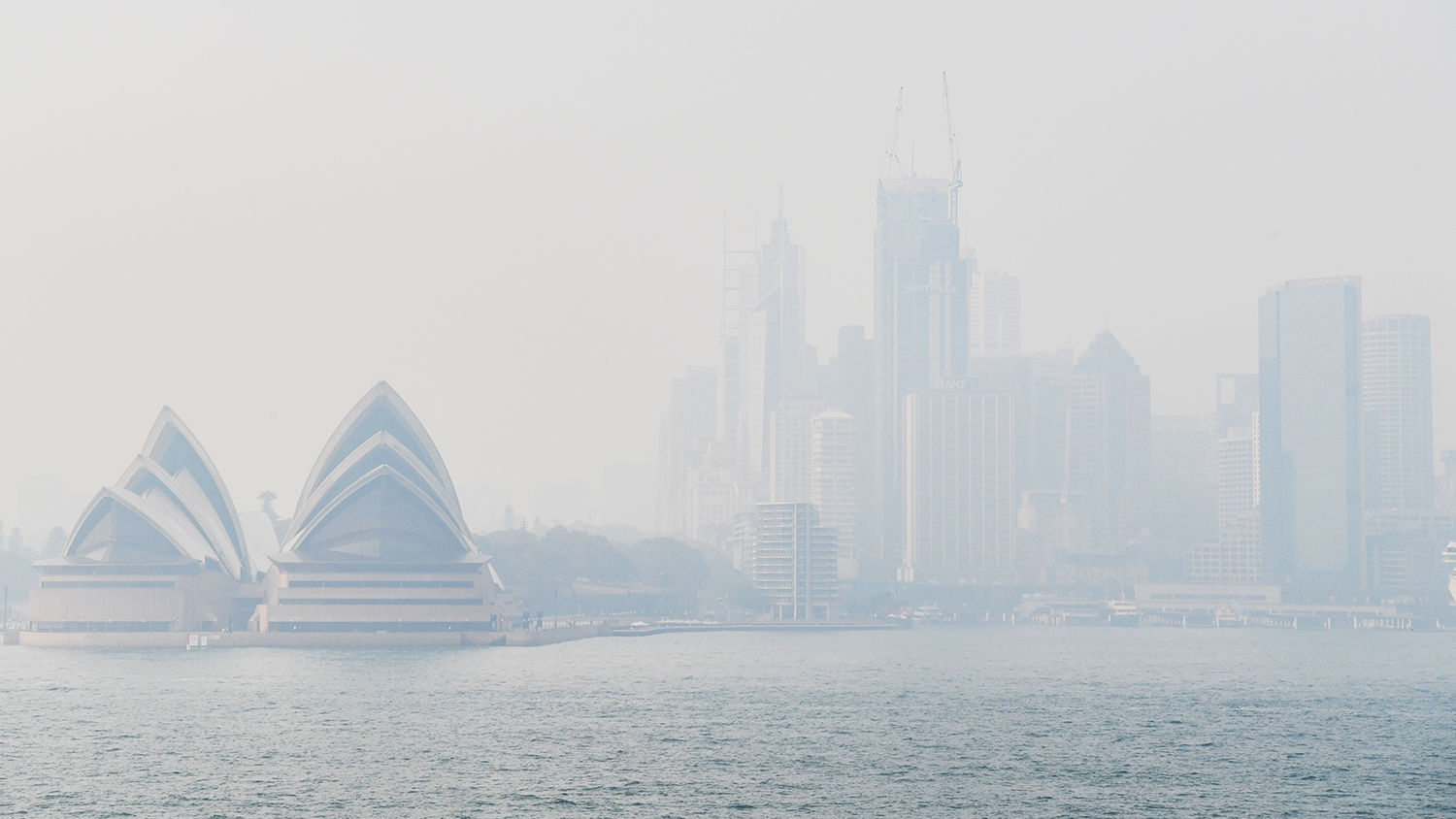
People from all over the world have been lining up for a chance to holiday and live in Australia based on our beautiful beaches, iconic bushland and fresh air. The Department of Home Affairs has been managing this constant influx of applications, which remain in high demand despite lengthy processing times and costly visas with comparison to other countries.
It seems that for perhaps 15 years, ever since the Tampa boat crisis, Australian immigration has been seen mostly through the prism of fear about the arrival of unwanted asylum seekers, or "boat people". This view of Australian immigration was and has been based on the assumption that Australia is a really attractive place to go to and that people are always going to be desperate to come here.
However, the Australian bushfire crisis raises an entirely new problem. What if people do not want to come to Australia in the future?
The world has seen many headlines and images in relation to Austarlian Bushfires and the damage they have caused. Will people fall out of love with the idea of Australia as a natural paradise, and could we see a significant drop in work, student and even family visa applications as a result?
Australia also needs to be mindful of not underplaying the Bushfire Crisis by over-promising that things will be back to normal very soon. That would compoud the existing reputational damage in the event of other destructive events, such as dust storms, hail storms, and other extreme weather we cannot yet anticipate.
In other words, we need to recognise the problem without minimizing it or over inflating it. This leaves a very narrow policy line to walk.
The Federal Government has announced a $76 million recovery package, including $20 million for marketing to domestic travellers and $25 million for a global tourism campaign, but time will tell if this will be enough to convince people that Australia is worth spending their money and time to visit.
4. Policy Challenges posed by Bushfire Crisis
On November 16 2019, the Department of Home Affairs Immigration portfolio launched two new regional visas. Skilled Work Regional (Provisional) visa (subclass 491) and the Skilled Employer Sponsored Regional (Provisional) visa (subclass 494)
They were marketed to the Australian public as a strategy for stemming the population congestion in major cities such as Sydney and Melbourne and aimed at sending skilled people into regional areas where people are needed. Minister for Immigration, Citizenship and Multicultural Affairs, David Coleman said “For people who migrate to Australia, permanent residency is on top of their list. By linking permanent residency to their stay in regional Australia will help improve compliance."
The Bushfire crisis comes at a particularly terrible time for this migration program, which is the Department's main focus. Life in a country town is already a challenging prospect for someone unfamiliar with Australia, let alone the very real possibility of being affected by a natural disaster.
Over the last 10 years the DoHA has been consistent in raising the cost of visa applications and reducing the level of service provided.
It is now impossible to walk into a DoHA office without an appointment. Those that try to just turn up to the DoHA are likely to be escorted out by security.
Meanwhile, the alternative ways to contact the DoHA are very clogged and ineffective. It is common to wait for two hours to get through on the phone number (a similar experience to the Centrelink customer service model), and the DoHA often takes months to repsond to email correspondence, if they do at all.
This approach to Australian Visas and Immigration, to be ever more expensive and provide ever lower service, may exacerbate problems in attracting the people we need for our recovery.
Industries like international education and tourism are internationally competitive and if Australia makes things too difficult there are other attractive alternatives including Hawaii, Bali or Thailand.
It's possible to introdcuce more flexible approaches by the DoHA to assist those with applications in the system or those applying for new visas. Many visas have regulations that say:
- These are the key requirements
- Unless the Minister decides that they do not need to be met
In reality, the DoHA has very rarely used such discretions and has spent much effort to develop arguments as to why discretions will only be used in the most extreme of compelling and compassionate circumstances. I suggest the compelling and compassionate circumstances exist here and now.
Australia has benefitted from some of our key competitors kicking "own goals" and making themselves less attractive for tourism and education, namely the UK and US. Unfortunately we are now also facing some reputational challenges, in the form of the Bushfire crisis.
One immediate way of responding to this potential population and labour problem would be an increase in funding for the Department of Home Affairs immigration and citizenship to decrease processing times to help clear the existing backlog. We will wait to see exactly how the Prime Minister and the Federal Government will respond to this Challenge.
Key industry bodies such the Migration Institute of Australia (MIA), the peak body for migration agents and Immigration Lawyers, will have valuable insights and suggestions to mitigate the effects. The DoHA will benefit from such insights and will also need to consult and act in a timely manner.
Conclusion
As we have outlined there are immediate questions for next steps for visa holders directly affected by the bushfires and their welfare.
There will be challenges ahead for all levels of government to deal with the damage to Australia's reputation as leading tourist destination and a place to settle and build a brighter future. It is our hope that this will lead to some sensible policy adjustments by the DoHA and increased funding to the department's services provision.
Please do not hesitate to get in touch with us: we are ready to help. Call us on +61 8 8351 9956 or This email address is being protected from spambots. You need JavaScript enabled to view it. us
This article was written by Principle Lawyer and Migration Agent Chris Johnston and Denise Street
Chris Johnston
Based in Adelaide South Australia, Immigration Lawyer and Migration Agent Chris Johnston providesmigration advice to people and businesses from all over the world. In 2011 Chris founded Work Visa Lawyers,
continuing on his practice focus on the area of work visas and business visas.
Chris is a member of the Migration Institute of Australia (MIA). The MIA is the peak professional body for registered migration agents.
As a member of the MIA, Chris stays abreast of all migration legislation and policy changes and other issues relevant to the migration advice profession.
Contact him for comment on +61 8 8351 9956 Email This email address is being protected from spambots. You need JavaScript enabled to view it.
Denise Street
Denise is the Work Visa Lawyers's Marketing Officer
Contact her for all media enquires on +61 8 8351 9956 or mediaThis email address is being protected from spambots. You need JavaScript enabled to view it.





